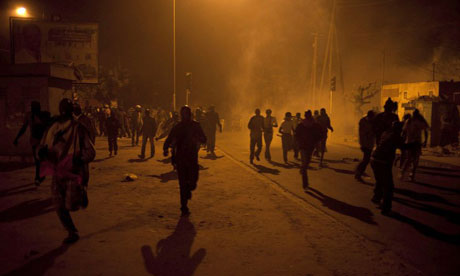Among all African countries, Senegal has consistently stood as a beacon of political light. As one of the only African state to never experience a coup d'etat, Senegal's government has been characterized
by long-term political stability. However, it is possible that all of this is about to change.
Before addressing the current state of affairs in Senegal, let's rewind 50 years to review the political trajectory of the country. As mentioned in my previous post, Senegal gained independence from France on April 4, 1960. For 40 years, the country was controlled by the socialist party, with its first president being Leopold Senghor, who remained in that position until 1981. At this point in time, Abdou Diouf replaced him as president. It was not until 2000, after Diouf had served four consecutive terms, that Abdoulaye Wade, a member of the Senegalese Democratic Party, ended the 40 year socialist reign.
Wade was eagerly welcomed to the presidency and pushed a relatively liberal agenda, supporting an open market and encouraging raising the country's profile, both locally and nationally. As mentioned in my post, "A Brief History," Wade has also encouraged the integration of diaspora members, especially those originally from Senegal who now live abroad. Despite the initial prosperity of the country under his presidency, recent political changes have transformed the once stable republic into chaotic turmoil.
In 2001, during Wade's first term as president, the constitution was amended such that a president in Senegal can only serve up to two terms in office. Despite the implementation of this new rule, Wade is currently running for a third term in office, claiming that because the amendment was not capped until he had already served a term in office, he technically should be granted an additional term. Not surprisingly, the seemingly unconstitutional candidacy of the 85 year old president for a third term has angered many citizens, leading to violent protests and, so far, the death of four citizens. Furthermore, Wade has been criticized for apparently hiring local citizens to show up at his speeches and feign an air of campaign solidarity. I've included some pictures below that capture the current political atmosphere in Senegal.
Additionally, for video footage and commentary on the recent protests, see the video above.
The country previously renowned for its peaceful political environment has transformed into a hotbed for riots, disorder, and general public dissatisfaction. Just several days ago, protestors stoned several cars carrying Wade's convoys. As the February 26th election nears, both the security and stability of the country are quickly dwindling. With 13 candidates running in opposition to Wade, the Senegalese people are hopeful that there will soon be an end to the unrest.
Protest Images:
Sources:
Associated Press, "Senegal's president's convoy stoned on campagin trail." USA Today, February 8, 2012. http://www.usatoday.com/news/world/story/2012-02-08/senegal-presidential-convoy-stoned/53015912/1
Associated Press, "Police fire tear gas at Senegal opposition protest." CBS News, February 15, 2012. http://www.cbsnews.com/8301-501710_162-57378101/senegal-bans-anti-government-demonstration/
Buya Jammeh, "Senegal's Wade intensified campaign amid protests." Africa News, February 15, 2012.
http://www.africanews.com/site/Senegals_Wade_intensifies_campaign_amid_protests/list_messages/41110
Constitution Net. "Constitutional history of Senegal," last modified 2012, http://www.constitutionnet.org/country/constitutional-history-senegal
globalEdge, "Senegal: Government," Michigan State University, last modified 2012, http://globaledge.msu.edu/Countries/Senegal/government
U.S. Department of State, United States Government, last modified January 13, http://www.state.gov/r/pa/ei/bgn/2862.htm



Great post Hannah! This is a very interesting political issue that alludes to your grasp of Senegal's current events. Let us know how the February 26th election day pans out.
ReplyDeleteI couldn't help but think how unwise it is for 13 candidates to run in opposition. If the citizens of Senegal truly despise the possibility of a third term, it is in their best interest to find one or two truly competitive candidates. If this is the case, I'd love to hear media's projections.
I read in the Washington Post earlier today that former Nigerian President Olusegun Obasanjo is in Senegal, trying to intervene. Apparently, he has helped several countries deal with conflicts elsewhere in Africa. Let me know if his attempt to mediate works out.
It's also quite puzzling to hear of riots in what is normally such a peaceful country and it's unsettling to hear that Wade is able to override constitutional law. A concern of mine would be the extent of his power throughout the voting process. Do you think it's possible that the election can be rigged? If he is elected, is 85 years far too old to run a country? I wonder what the line of succession is for the President as death while in office would be a pressing concern of mine (i.e. VP's ability)?
I love the design and content, keep it up!
Ted
All great questions! I actually have quite the update regarding the election in Senegal. Despite the bitter protests, Wade did in fact continue in the race for presidency. However, in the second round of elections he was ultimately defeated by the now President Macky Sall, a member of the Alliance for the Republic party. Interestingly and perhaps deservingly, Wade lost by a significant margin within his very own constituency.
ReplyDeleteInteresting note about President Olusegum Obasanjo. Because he was sent in after the first round of elections and then Wade was soon after defeated, his efforts, although applaudable, appeared to come a little late. Luckily, the defeat of Wade has seemed to put a temporary (and hopefully long-term) end to the chaos in Senegal.
You mentioned the potential for corruption regarding Wade's involvement in the election. Although it's possible, he not only lost but also "accepted his defeat gracefully," President Obasanjo noted (see http://www.leadership.ng/nga/articles/20429/2012/03/27/senegals_presidentelect_sall_takes_over_april_1.html for more info). But, all of your questions would have been crucial issues had Wade been elected, especially given his old age. Apparently the citizens of Senegal held similar concerns!